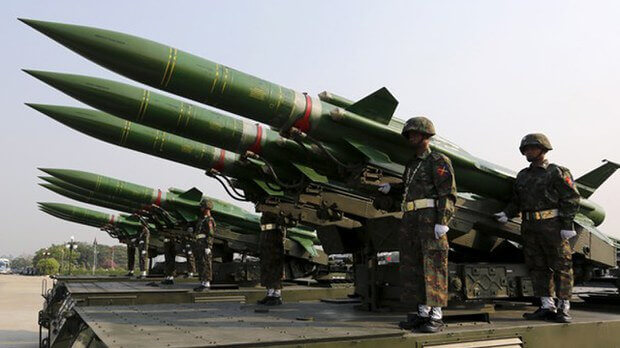A new UN report released on Wednesday shows that the Myanmar military has imported at least $1 billion in arms and raw materials to manufacture weapons, since the military coup in February 2021, from countries including Russia, China, and India.
Trade Network
The report, compiled by a UN-appointed independent expert monitoring and investigating human rights abuses in the country, shows that the trade’s major networks and companies are located in Russia, China, Singapore, Thailand, and India.
“Russia and China continue to be the main suppliers of advanced weapons systems to the Myanmar military, accounting for over $400 million and $260 million, respectively, since the coup, with much of the trade originating from state-owned entities”, UN Special Rapporteur, Tom Andrews said.
He added that arms dealers operating out of Singapore are also “critical to the continued operation of the Myanmar military’s deadly weapons factories.”
#Myanmar’s military has imported at least $1 billion in arms and other material since it staged a coup in February 2021, a #UN expert said on Wednesday in a new report that calls out #Russia and #China for aiding the junta's deadly campaign to crush its opposition. pic.twitter.com/ozbMdrT5DL
— RTA English (@rtaenglish1) May 18, 2023
Circumventing Sanctions
The report reasoned that this trend has continued because some UN member countries are enabling the weapons trade “through a combination of outright complicity, lax enforcement of existing bans, and easily circumvented sanctions.”
The suppliers “are able to avoid sanctions by using front companies and creating new ones while counting on lax enforcement,” Andrews said.
Despite the “overwhelming evidence” of atrocity and “crimes against the people of Myanmar,” the country’s military generals “continue to have access to advanced weapons systems, spare parts for fighter jets, raw materials and manufacturing equipment for domestic weapons production,” the official added.
“The Myanmar military and its arms dealers have figured out how to game the system. That’s because sanctions are not being adequately enforced and because arms dealers linked to the junta have been able to create shell companies to avoid them,” the UN higher-up stressed.
Complete Trade Ban
“The good news is that we now know who is supplying these arms and the jurisdictions in which they operate. Member States now need to step up and stop the flow of these arms,” Andrews said.
He also called for a “complete ban on the sale or transfer of weapons” to the junta regime and pleaded for governments “to enforce existing bans while coordinating sanctions on arms dealers and foreign currency sources.”

